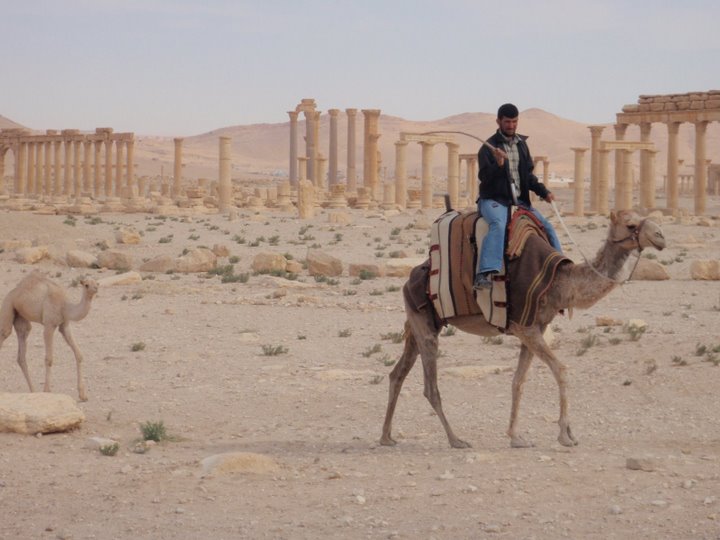Syria Feature: The Tour Guide Who Joined the Insurgency (Barnard)
 A Camel Rider in PalmyraAnne Barnard writes for The New York Times:
A Camel Rider in PalmyraAnne Barnard writes for The New York Times:
To the tourists he took on sunset camel rides, Abu Zeid seemed like the freest man on earth.
He was a young Bedouin who worked with his camel, Casanova, among the ruins of ancient Palmyra, in the Syrian desert. He spent his days roaming Palmyra’s bare hills and stone colonnades, and his nights chatting online with foreign friends. In recent years, his biggest complaint with the government was that the police demanded bribes.
So his friends were astonished when he told them that he had joined the uprising against President Bashar al-Assad.
Abu Zeid’s evolution from carefree tour guide to revolutionary offers a rare glimpse of a single life transformed by an uprising that has jolted thousands from their daily routines, and of the ambivalence many Syrians feel toward a revolution that has already brought so much chaos.
Abu Zeid and several friends took up arms after security officers shot demonstrators in Tadmur, the modern town near Palmyra. Now, alternately passionate and confused, Abu Zeid has only the dimmest idea of an endgame, swept up in a wave heading nowhere clear.
He wavers, unsure whether joining the revolt was his life’s proudest moment or its ruin — or both.
His exploits, sometimes more Keystone Kops than Che Guevara, left him feeling empowered but morally conflicted. He stole money and weapons, something he struggles to justify to himself. He endangered his neighbors, beat up an informer and narrowly escaped a raid that killed some of his friends after one drew attention to their hide-out by getting stuck in an elevator. Even his beloved camel ended up dead.
Now he is a jobless fugitive in a country bordering Syria, heartsick for a life in which, he said, “I felt like a king in my own way.”
Like someone who grew up near the sea and is drawn to water, Abu Zeid spends hours visiting ancient ruins, quizzing people about his new country’s tourist industry. He worries that unrest will harm his family, or Palmyra’s antiquities. One moment he vows to go back and fight; the next he disavows violence.
“I hate my life this way,” he told a friend in a recent message.
Yet he will be proud if Mr. Assad leaves office, he said: “They can’t keep talking as if we are nobody — we are citizens.”
This account of one man’s struggle is based on interviews with Abu Zeid, a fellow fighter and two women who have known Abu Zeid for years. One is a Syrian-American who met him while touring in Palmyra in 2008 and says she is neutral toward the uprising. The other is Abu Zeid’s girlfriend, a French citizen who has worked in Syria. All asked not to be fully identified to protect family and friends in Syria.
 Abu Zeid,
Abu Zeid,  Anne Barnard,
Anne Barnard,  New York Times,
New York Times,  Syria
Syria 
Reader Comments